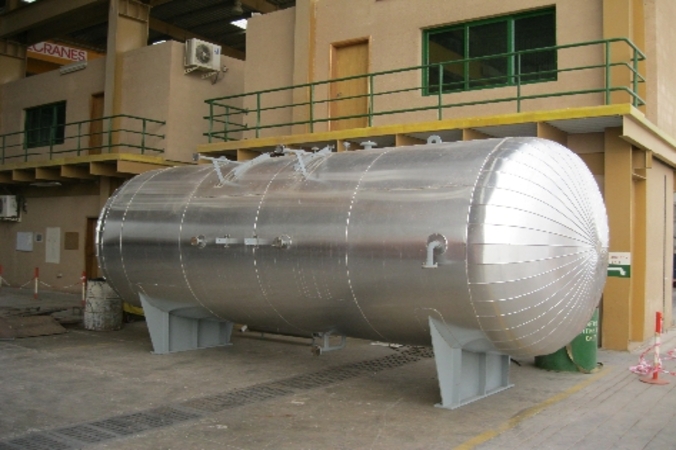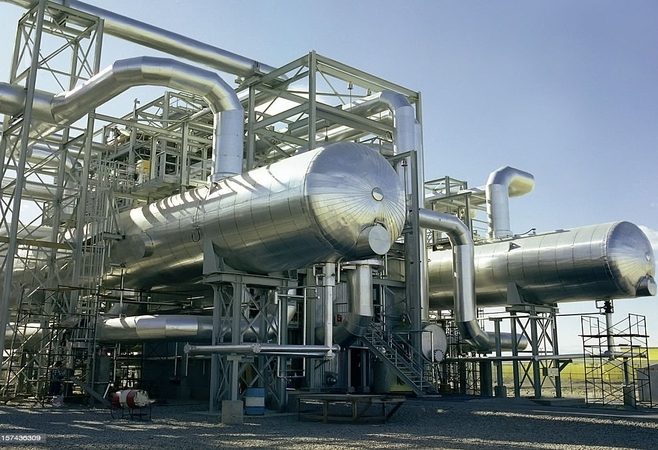
Pressure vessels are essential in a variety of industries, from chemical plants to oil refineries, and their safe operation is critical. These vessels are built to handle enormous pressures, yet they can be dangerous if not properly protected. In this article, we will look at the critical safety standards for pressure vessels, emphasizing their importance in protecting people, property, and the environment.
At MEFAB, we take extra safety precautions in pressure vessels. MEFAB is known as one of the best pressure vessel manufacturer in UAE. We provide the best pressure vessels in the UAE by understanding the importance of adhering to safety standards in the production and operation of pressure vessels. Whether it’s for chemical processing plants, power production facilities, or oil refineries, pressure vessels play a vital role in various industries.
What is a pressure vessel?
A pressure vessel is a container designed to hold fluids or gases at much higher pressures than the surrounding atmosphere. These tanks are used in a variety of sectors to store, process, or transport high-pressure compounds. Pressure vessels occur in a variety of shapes and sizes, ranging from small cylinders to massive tanks, and can be found in a variety of industries, including chemical processing plants, power production facilities, oil refineries, and even everyday objects such as compressed air tanks. They are made of materials that can resist the appropriate pressure and are outfitted with safety elements to ensure correct operation and prevent catastrophic failures.
1. Sturdy Design and Fabrication:
The design and manufacture of pressure vessels form the cornerstone of their safety. During this stage, it is critical to adhere to industry norms and laws. Operating pressures, temperatures, material strength, corrosion resistance, and load-bearing capability must all be considered by designers.
Furthermore, fabrication must be performed by qualified specialists that are knowledgeable in welding, material selection, and non-destructive testing. Strict quality control techniques, including radiography and ultrasonic inspection, ensure the vessel’s integrity and aid in the detection of any defects or weaknesses that could jeopardise its safety.
2. Pressure Relief Systems:
Pressure relief devices are crucial for preventing catastrophic pressure vessel failures. Safety valves and rupture discs, for example, operate as fail-safe systems to relieve excess pressure and prevent the vessel from bursting. To ensure proper operation, they must be properly sized, fitted, and maintained.
To avoid overpressure situations, safety valves must be properly calibrated. Regular inspections, testing, and maintenance aid in the detection of any flaws that may impair their performance. Failure to install or maintain these devices can result in serious repercussions, such as explosions or leaks that endanger employees and nearby infrastructure.
3. Selection and Inspection of Materials:
The proper materials must be used to maintain the integrity and longevity of pressure vessels. Materials must be compatible with the process fluids, corrosion-resistant, and able to bear the desired operating conditions. Because of their strength and corrosion resistance, stainless steel, carbon steel, and alloys such as Inconel are often used.
Pressure vessels must be inspected regularly to detect signs of corrosion, erosion, or other types of degradation. Visual inspection, dye penetrant testing, and ultrasonic testing all aid in assessing the state of the vessel and identifying potential flaws. Repairs or replacements performed on time can avert problems and assure continuous safety.
4. Training and Competence:
Personnel involved in pressure vessel operation, maintenance, and inspection must be properly trained and competent. Personnel must be informed of the vessel’s design, limitations, and safety precautions. Emergency procedures, risk assessment, and adherence to safety regulations should all be covered in training programs.
5. Inspection and maintenance regularly
Pressure vessels require routine maintenance and inspection to maintain long-term safety. Monitoring performance metrics, examining corrosion rates, and doing non-destructive testing are all part of this. Inspection intervals should be by industry standards and the vessel’s operational conditions. Proper maintenance can discover possible problems before they become serious, lowering the chance of failure and ensuring the vessel’s safety and dependability.
Mefab is well-known as one of the best pressure vessel manufacturers in the UAE for oil and gas refineries and the oil and gas industry. We understand that high-quality workmanship, on-time delivery, and value are important to our oil and petrol refinery customers. We provide the best pressure vessels in UAE, by which most of the Oil and gas refinery companies rely on MEFAB to complete their steel fabrication projects on time because of our metalworking expertise, custom industrial equipment fabrication services, specialized equipment, heavy steel fabrication capabilities, and ASME code pressure vessel design, engineering, and manufacturing services.

